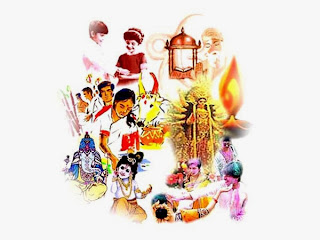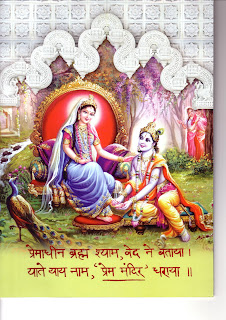Jagadguru shri Kripalu Ji Maharaj explains Hare Ram kirtan
Jagadguru shri Kripalu Ji Maharaj explains Hare Ram kirtan
Hare Ram Hare Ram Ram Ram Hare Hare
Hare Krishna Hare Krishna Krishna Krishna Hare Hare
You see, this 'Hare Ram' sankirtan is described in the Vedas. Other sankirtans have been composed and revealed by Saints and some have been written by ordinary worldly people. These days, people make kirtans based on tunes from film songs and in all-night chanting events they create a huge storm of devotional entertainment. That's not what kirtan is all about.
This 'Hare Ram Hare Ram' is a mantra of an Upnishad. There is an Upnishad called 'Kalisantarnopnishad'. This (Hare Ram) Ved mantra has been revealed for the souls of kaliyug. All the Ved mantras in the Upnishads have particular and very distinct vocalics and rules. However, in this (Hare Ram mantra), there is no formality or protocol. The Vedas have given this freedom. You could be in the most unpleasant environment and in the most unfavorable situation and keep chanting this mantra. There is no such strict rule where one would have to first take a bath or face the east (in order to chant Hare Ram).
There are three words in this mantra - Hari, Ram and Krishna. So, a lot of people have this misconception that, "We are worshippers of Ram and chanting 'Hare Krishna' is a little difficult for us. I cannot absorb my mind." There is an organization by the name of 'Gaudiya Sampradaya' that has reversed this mantra. They say, 'Hare Krishna Hare Krishna' followed by 'Hare Ram Hare Ram'. These differences that Ram, Krishna and Hari are separate are indicative of one's defective and polluted mind. Actually, it is not like that.
Whatever is the meaning of the name Hari, the same is the meaning of the names Ram and Krishna. Likewise, whatever is the meaning of the name Krishna, the same is the meaning of the names Hari and Ram. God has uncountable names, uncountable forms and uncountable descensions. God Himself has said, "I Myself cannot count My own appearances, My own descensions, My own names and My own virtues." Why? "Because they are unlimited. I have given souls full right and freedom to call Me by whatever name they desire." This is the extent of the privilege granted by God to the souls.
Mother Yashoda never chanted the 'Hare Ram' mantra. (She used to say,) "Hey Kanua! Come here." Where in the Vedas is such a name (of Shri Krishna) described? Just as we nickname our kids out of affection - Pappi, Pappu, Khappu, Gappu - they still get called by their nickname even after they grow up and go to college, as the same name was given at the time of admission into college.
Thus, God has infinite names. For this very reason, whether anyone is a worshipper of Lord Vishnu, a worshipper of Lord Ram, a worshipper of Lord Krishna or a worshipper of another descension, this mantra can be chanted for all the forms of God. What does 'Hari' mean? It means the one whose Divine beauty entices and captivates the hearts of paramhans. Vishnu, Ram and Krishna all entice and captivate the hearts of paramhans. Many scriptures describe that the names Ram and Krishna have the same meaning.
Therefore, whether anyone is a worshipper of Ram or Krishna, they are all various names of God and they all have the same meaning. For this reason, one should be careful to not allow any kind of doubt creep into the mind (about the absolute oneness and greatness of the various forms of God) and along with that, everywhere, all the time and in every situation, anyone has the freedom to do jap or chant 'Hare Ram' mantra.
Translated by Sushri Diwakari Deviji of Radha Madhav Dham
Visit Diwakari Devi's blog for more lecture translations: http://radhamadhavdham.org/blogs/sushree-diwakari-devi
Hare Ram Hare Ram Ram Ram Hare Hare
Hare Krishna Hare Krishna Krishna Krishna Hare Hare
You see, this 'Hare Ram' sankirtan is described in the Vedas. Other sankirtans have been composed and revealed by Saints and some have been written by ordinary worldly people. These days, people make kirtans based on tunes from film songs and in all-night chanting events they create a huge storm of devotional entertainment. That's not what kirtan is all about.
This 'Hare Ram Hare Ram' is a mantra of an Upnishad. There is an Upnishad called 'Kalisantarnopnishad'. This (Hare Ram) Ved mantra has been revealed for the souls of kaliyug. All the Ved mantras in the Upnishads have particular and very distinct vocalics and rules. However, in this (Hare Ram mantra), there is no formality or protocol. The Vedas have given this freedom. You could be in the most unpleasant environment and in the most unfavorable situation and keep chanting this mantra. There is no such strict rule where one would have to first take a bath or face the east (in order to chant Hare Ram).
There are three words in this mantra - Hari, Ram and Krishna. So, a lot of people have this misconception that, "We are worshippers of Ram and chanting 'Hare Krishna' is a little difficult for us. I cannot absorb my mind." There is an organization by the name of 'Gaudiya Sampradaya' that has reversed this mantra. They say, 'Hare Krishna Hare Krishna' followed by 'Hare Ram Hare Ram'. These differences that Ram, Krishna and Hari are separate are indicative of one's defective and polluted mind. Actually, it is not like that.
Whatever is the meaning of the name Hari, the same is the meaning of the names Ram and Krishna. Likewise, whatever is the meaning of the name Krishna, the same is the meaning of the names Hari and Ram. God has uncountable names, uncountable forms and uncountable descensions. God Himself has said, "I Myself cannot count My own appearances, My own descensions, My own names and My own virtues." Why? "Because they are unlimited. I have given souls full right and freedom to call Me by whatever name they desire." This is the extent of the privilege granted by God to the souls.
Mother Yashoda never chanted the 'Hare Ram' mantra. (She used to say,) "Hey Kanua! Come here." Where in the Vedas is such a name (of Shri Krishna) described? Just as we nickname our kids out of affection - Pappi, Pappu, Khappu, Gappu - they still get called by their nickname even after they grow up and go to college, as the same name was given at the time of admission into college.
Thus, God has infinite names. For this very reason, whether anyone is a worshipper of Lord Vishnu, a worshipper of Lord Ram, a worshipper of Lord Krishna or a worshipper of another descension, this mantra can be chanted for all the forms of God. What does 'Hari' mean? It means the one whose Divine beauty entices and captivates the hearts of paramhans. Vishnu, Ram and Krishna all entice and captivate the hearts of paramhans. Many scriptures describe that the names Ram and Krishna have the same meaning.
Therefore, whether anyone is a worshipper of Ram or Krishna, they are all various names of God and they all have the same meaning. For this reason, one should be careful to not allow any kind of doubt creep into the mind (about the absolute oneness and greatness of the various forms of God) and along with that, everywhere, all the time and in every situation, anyone has the freedom to do jap or chant 'Hare Ram' mantra.
Translated by Sushri Diwakari Deviji of Radha Madhav Dham
Visit Diwakari Devi's blog for more lecture translations: http://radhamadhavdham.org/blogs/sushree-diwakari-devi




Comments
Post a Comment